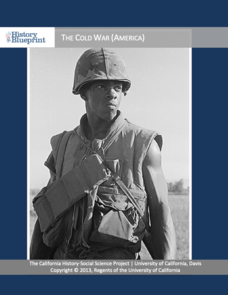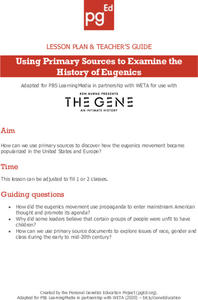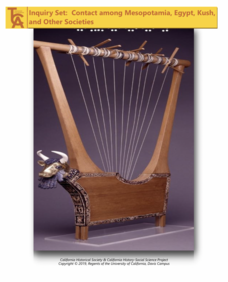Stanford University
Historical Thinking Chart
Narrow down your questions about author perspective, historical context, and veracity of claims in a document with the help of a historical reading chart. Learners track the basics of the document along with advanced evaluation skills...
Annenberg Foundation
America's History in the Making: Using Digital Technologies
How can digital technology of today link us to the events of the past? Scholars use technology to uncover the vast number of historical resources available in lesson 12 of a 22-part America's History in the Making series. Using databases...
Houston Independent School District
Creating a Successful Project
Guide your learners step by step through the process of designing an original, independent student project. This resource includes a wealth of worksheets and materials, including student project checklists, timelines, primary and...
Center for History and New Media
Founding of the Laurel Grove School and Other "Colored" Schools in Fairfax County, 1860–1890
The right to public education was not always so clear in American history. Readers study several primary and secondary source documents, including property deeds, maps, and photographs, about the founding of local schools during the...
Wells Fargo
Wells Fargo History Museum: Curriculum Guide
Learn about the California Gold Rush from an institution that has been in place since the early days of the American West: Wells Fargo History Museum. From domain-specific vocabulary review to group research projects, an expansive packet...
City University of New York
Jim Crow and the Fight for Civil Rights
The history of voting rights in America has always been rocky, especially in the time period after the Civil War. Learn about the ways that Jim Crow laws affected the voting rights of African Americans with a lesson featuring primary...
US National Archives
WWII: Western Europe 1939-45 – Deception and Bluff
World War II left the British desperate for help in any form—including in the form of a magician! High schooler conduct research on Jasper Maskelyne, a stage magician who used his talents to deceive the Germans on the war front, before...
US National Archives
Eastern Europe 1939-45 — Berlin
The inevitability of World War II has arrived: Berlin has fallen. Young historians watch contemporaneous footage of the event, analyze primary source documents, and write a news report that details the roles of the Soviet, British,...
University of California
The Cold War (America)
The Cold War—with its roots in World War II—impacts the world today. Using an extensive curriculum, scholars consider its impact through primary sources, including speeches and propaganda, as well as other skills-enhancing activities. An...
North Haven Middle School
Environmental Expert Presentation
Individuals or groups select an environmental issue, then spend time researching and creating a presentation to share in class. By allowing learners to choose the issue that matters most to them, you will motivate them to do excellent...
Maryland Department of Education
The Concept of Diversity in World Literature Lesson 9: Debating Imperialism
To gain an understanding of Imperialism, class members read Rudyard Kipling's poem, "The White Man's Burden" and Mark Twain's essay, "To the Person Sitting in Darkness." Groups compare these perceptions of non-white cultures with the...
City University of New York
Urban Politics: Machines and Reformers
Take a trip to the turn of the twentieth century with a resource about industrialism in America. With primary source documents and focus questions, learners think about the ways that government groups and organizations paved the way for...
Personal Genetics Education Project
Using Primary Sources to Examine the History of Eugenics
Eugenics philosophy takes survival of the fittest to a whole new level. With a research-focused lesson, young scientists examine the history of the eugenics movement and its impact on society. Pupils engage with a video clip, primary...
Curated OER
Learning From Document - Public Laws
Learners research primary sources about the Bracero worker program. In this primary source lesson, students investigate two public laws along with other documents to determine if the Bracero worker program was implemented properly. They...
Curated OER
Using Primary Source Documents in the Classroom
Students use primary documents to explore the past. They consider the source of the documents and identify and biases that the author may have held. They identify any questions about the historical event that may remain after reading the...
California Department of Education
Evaluating Web Sites
If it's on the Internet, it must be true—right? How can someone tell if a website contains less-than-truthful information? Savvy surfers evaluate sources in the fifth of a six-part college and career readiness instructional activity...
Curated OER
Research Paper
An outline for a research paper assignment lists the expectations, grading rubric, and due dates for an extended research writing project.
Google
Advanced 5: Evaluating Credibility of Sources
How do discerning readers determine bias and credibility? Ask small groups to figure it out! First, each group is provided with either articles or videos that contain bias. They examine the resources, respond to included questions, and...
Google
Intermediate 4: Searching for Evidence for Research Tasks
Online resources take many forms: blogs, search engines, news websites, documents, wikis. In order to conduct effective research, pupils should become familiar with different formats so that they can more easily choose suitable sites for...
University of California
Contact among Mesopotamia, Egypt, Kush, and Other Societies
Trade has always been a global affair. Explore what global trade meant for ancient Mesopotamians, Egyptians, and Kushites using a collection of documents from the historic societies. By examining literary works such as the Epic of...
Google
Beginner 4: Searching for Evidence for Research Tasks
Having a strong searching skill set can make a research project much easier and much for successful for pupils. Tackle finding evidence with the ideas included here. The ultimate goal is for class members to learn the stepping stones...
New York State Education Department
Global History and Geography Examination: August 2010
Three major faith traditions have shaped world history: Christianity, Islam, and Buddhism. Using secondary sources from textbooks, as well as primary source documents, such as Aztec legends, pupils explore the interplay of these...
Google
Advanced 4: Searching for Evidence for Research Tasks
Research was very different in the past. Pupils once had difficulty finding sufficient information, but now they have the opposite problem. Show your class how to pick the best resources out of the millions of sites an online search will...
EngageNY
Grade 9 ELA Module 3, Unit 2, Lesson 7
Now that learners have honed their inquiry-based projects down to their strongest few questions, they can conduct independent research. High schoolers pursue answers to their inquiries while assessing sources, establishing a research...

























